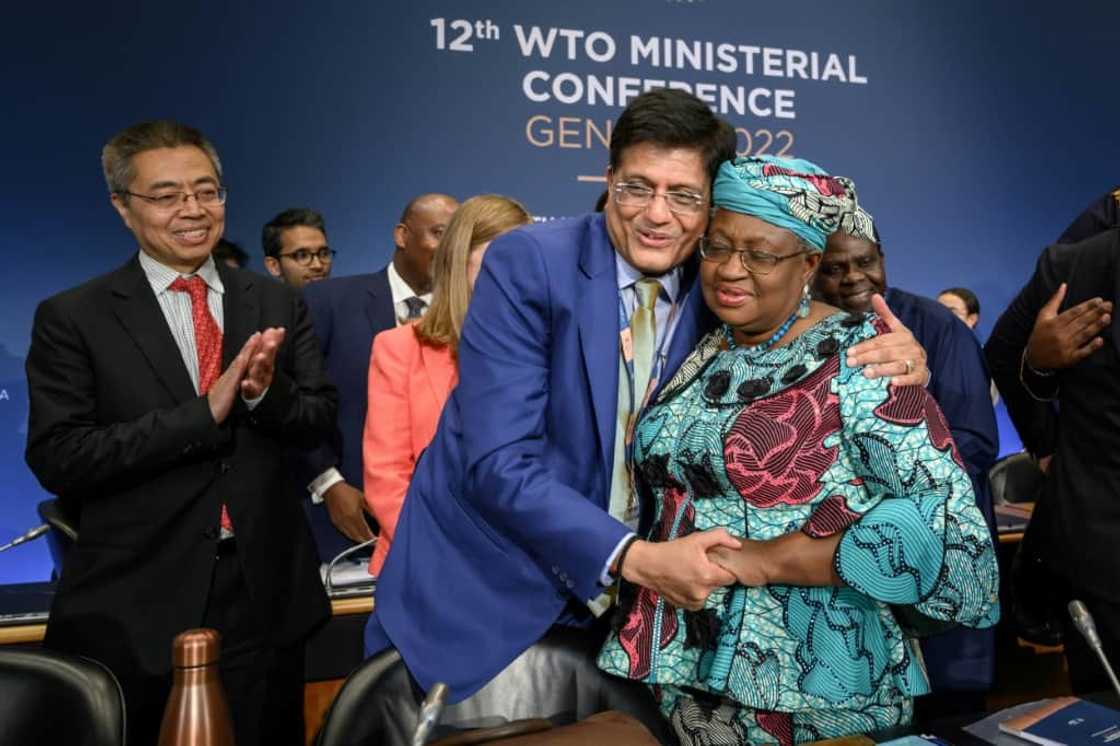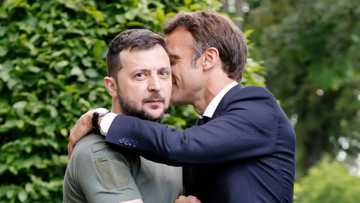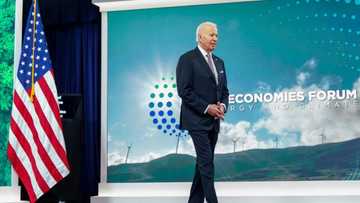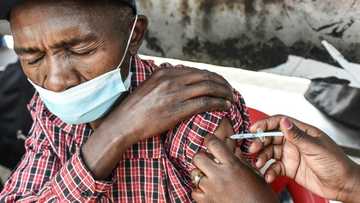WTO strikes landmark deals package after marathon talks

Source: AFP
PAY ATTENTION: Follow Briefly News on Twitter and never miss the hottest topics! Find us at @brieflyza!
The World Trade Organization concluded a landmark bundle of deals Friday covering fishing subsidies, food insecurity and Covid-19 vaccines following hectic round-the-clock talks.
WTO director-general Ngozi Okonjo-Iweala said trade ministers had struck an "unprecedented" number of agreements that would affect the lives of people everywhere.
The talks in Geneva began Sunday and had been due to wrap up on Wednesday.
But instead the WTO's 164 members went through two straight nights before getting the package over the line at around 5:00 am (0300 GMT) Friday.
"DEAL!" tweeted EU trade commissioner Valdis Dombrovskis after the conference went nearly 36 hours into overtime.
The WTO's 12th ministerial conference (MC12) reeled in a deal to halt harmful fisheries subsidies after more than two decades of negotiations, and also reached agreements on e-commerce, responding to pandemics and reforming the organisation itself.
PAY ATTENTION: Follow us on Instagram - get the most important news directly in your favourite app!
"Not in a long while has the WTO seen such a significant number of multilateral outcomes," Okonjo-Iweala said.
"The package of agreements you have reached will make a difference to the lives of people around the world."
But she acknowledged that "there were many moments when I feared we would come out of MC12 with nothing at all".
As negotiations dragged on, delegates at one point had even danced to songs like "I will survive" and "Final Countdown" to blow off steam, US ambassador Maria Pagan told reporters.
Fish deal netted
The fisheries deal was the last one to get over the line, with negotiators hammering out the final points into the early hours of Friday.
Talks towards banning subsidies that encourage overfishing and threaten the sustainability of the planet's fish stocks had been going on at the WTO since 2001.
The text was watered down significantly, but Okonjo-Iweala insisted it was better to get an agreement rather than keep negotiating for years to come.
Dombrovskis acknowledged to reporters that the agreement fell short of what the EU would have wanted, but "we decided that taking this first step... was better than not getting any agreement".
US Trade Representative Katherine Tai also hailed the agreement, as "a positive step forward", highlighting that countries had committed to continue talks towards a more ambitious text.
Myron Brilliant, head of international affairs at the US Chamber of Commerce, highlighted the importance of moving forward on banning harmful fisheries subsidies.
"This is a rare case where trade rules could make a huge contribution to addressing a major environmental problem," he said.
Consensus
The fisheries agreement marks the first large multilateral deal agreed at the WTO in nearly a decade.
Okonjo-Iweala, who took over in March 2021, hinged her leadership on breathing new life into the sclerotic organisation.
She wanted to prove that the organisation could still make itself relevant in tackling the big global challenges.
The former foreign and finance minister of Nigeria positioned herself as someone who can bang heads together and get business done.
"I prefer to talk less and do more," she said Friday.
As for why the discussions went on so long, some delegations accused India of being intransigent on every topic under discussion at the WTO -- where decisions can only pass with the agreement of every member.
But Indian Commerce and Industry Minister Piyush Goyal insisted: "India is not a roadblock on anything... We were the ones who actually helped create the sole consensus."
Patents waiver
The second major issue on the table was the plan for a Covid-19 vaccine patents waiver, aimed at providing more equitable access to the jabs.
After months of wrangling, and talks going down to the wire this week to win over some major players in pharmaceutical manufacturing to a compromise text, the United States and China finally clinched the deal by agreeing on which countries would benefit from the waiver.
China provided a binding commitment not to take advantage of the waiver.
Tai hailed the deal, saying it would "get more safe and effective vaccines to those who need it most".
This agreement shows that we can work together to make the WTO more relevant to the needs of regular people.
The pharmaceutical industry organisation IFPMA however voiced "deep disappointment" at the deal, warning that "dismantling" patent protections would strangle innovation.
Public interest groups meanwhile condemned the deal for not going far enough.
"It is a technocratic fudge aimed at saving reputations, not lives," said Max Lawson of the People's Vaccine Alliance, while the Doctors Without Borders charity labelled it a "devastating global failure".
WTO members also agreed to help ease supply shortages that some countries faced during the pandemic.
With Russia's war in Ukraine fuelling a global food security crisis, ministers agreed on the importance of not imposing export restrictions.
But the need to secure consensus from all members, including from Moscow, meant their declaration did not mention Russia or its role in the crisis.
PAY ATTENTION: check out news exactly for YOU ➡️ find "Recommended for you" block and enjoy!
Source: AFP





